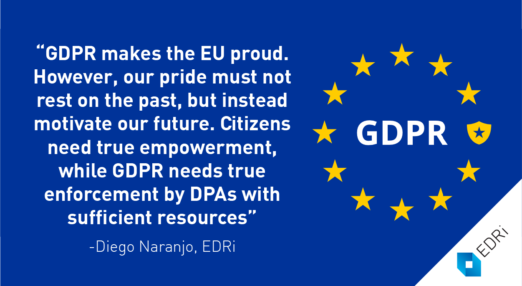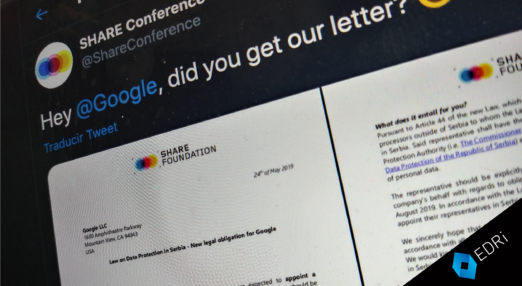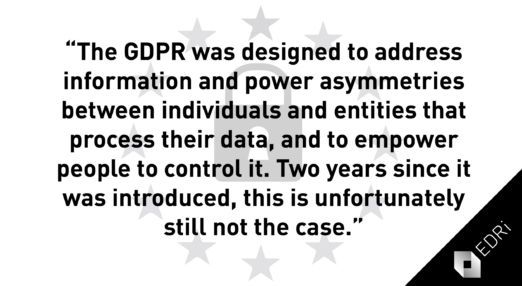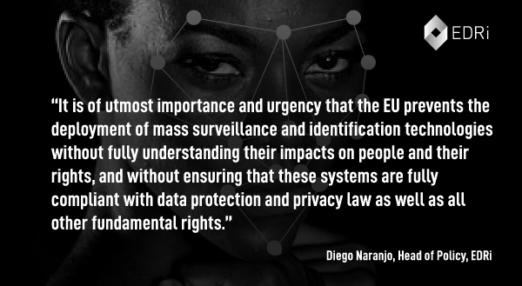GDPR
Filter by...
-

Digital rights for all
In this article we set out the background to EDRis’ work on anti-discrimination in the digital age. Here we take the first step to explore anti-discrimination as a digital rights issue, and then, what can EDRi do about it? The project is motivated by the need to recognise how oppression, discrimination and inequality impact the enjoyment of digital rights, and to live up to our commitment to uphold the digital rights of all.
Read more
-

EU must let its crown jewel shine: GDPR needs progress
On 24 June, the European Commission published the Communication reviewing of the two years of application of the General Data Protection Regulation (GDPR) The Communication received input from the multistakeholder expert group on the application of the GDPR, of which EDRi members Access Now and Privacy International belong to.
Read more
-

Massive political data leak in Malta
After a massive leak of the voter’s list showing the voting preferences, addresses, phones and dates of birth of a majority of the Maltese population, EDRi member noyb.eu will assist the Daphne Foundation and Repubblika in their class action and file complaints about the data breach in various EU Member States.
Read more
-

SHARE’s campaign bears fruit: Google appoints Serbian representatives
Serbian citizens can now bring their objections and requests regarding Google’s use of their private data to the tech giant’s new representative in the country.
Read more
-

Open Letter: EDRi urges enforcement and actions for the 2 year anniversary of the GDPR
On 25 May 2020, for the General Data Protection Regulation (GDPR) 2 year anniversary, EDRi sent a letter to Executive Vice-President Jourová and Commissioner Reynders to highlight and urge action to the tackle the GDPR’s vast enforcement gap.
Read more
-

Xnet issues two complaints to improve data protection in Spain
Xnet highlights gaps in Spain’s adaptation of the EU General Data Protection Regulation (GDPR). The Spanish member of EDRi has opened two complaints to the European Commission related to the lack of effective adaptation of the data minimisation principle and the lack of conciliation between personal data protection and freedom of expression and information in the Spanish legislation.
Read more
-

Austria’s biggest privacy scandal: residential addresses made public
Nobody took data protection into account for the so-called “Supplementary Register for Other Concerned Parties” (Ergänzungsregister für sonstige Betroffene). The Ministry for the Economy and the Finance Ministry are responsible for a data breach to which the Austrian Economic Chambers were an accomplice.
Read more
-

COVID-19 pandemic adversely affects digital rights in the Balkans
Cases of arbitrary arrests, surveillance, phone tapping, privacy breaches and other digital rights violations have drastically increased in Central and Southeast Europe as governments started imposing emergency legislation to combat the COVID-19 outbreak.
Read more
-

Competition law: what to do against Big Tech’s abuse?
This is the second article in a series dealing with competition law and Big Tech. The aim of the series is to look at what competition law has achieved when it comes to protecting our digital rights, where it has failed to deliver on its promises, and how to remedy this.
Read more
-

Security Information Service wins the Czech Big Brother Awards
The Czech Big Brother Award (BBA) 2019 winners are the Czech Security Information Service (BIS), the antivirus company Avast, and the energy company PRE. Positive prize of Edward Snowden went to the city of Prague.
Read more
-

A human-centric internet for Europe
The European Union has set digital transformation as one of its key pillars for the next five years. New data-driven technologies, including Artificial Intelligence (AI), offer societal benefits – but addressing their potential risks to our democratic values, the rule of law, and fundamental rights must be a top priority. “By driving a human rights-centric […]
Read more
-

Our New Year’s wishes for European Commissioners
EDRi wishes all readers a happy new year 2020! In 2019, we had a number of victories in multiple fields. The European Parliament added necessary safeguards to the proposed Terrorist Content Online (TCO) Regulation to protect fundamental rights against overly broad and disproportionate censorship measures. The Court of Justice of the European Union (CJEU) ruled […]
Read more
